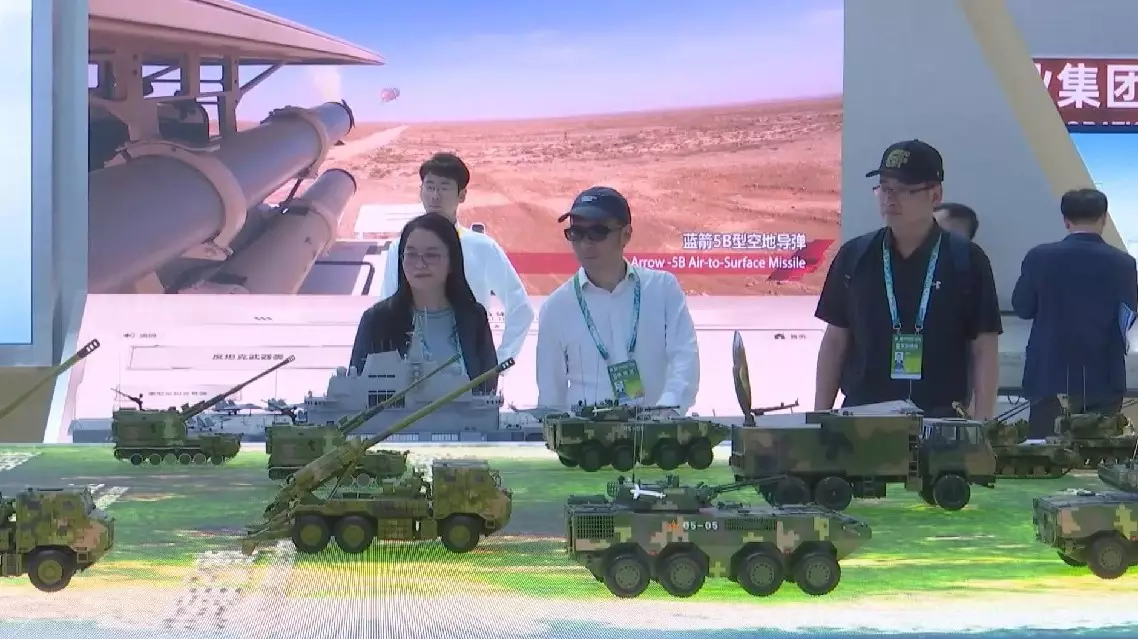The 15th China International Aviation and Aerospace Exhibition has fully showcased China's technological capabilities and commitment to innovation, while concurrently reflecting the nation's openness and transparency in the military sphere, said a military expert.
The event, also known as Airshow China or Zhuhai Airshow, kicked off on Tuesday in Zhuhai, a coastal city of south China's Guangdong Province.
At this year’s air show, the Equipment Development Department of the Central Military Commission established a dedicated zone for information release, which covers four key areas: achievements in equipment, policy introductions, military trade systems, and a forum for military equipment.
The department’s efforts have helped foster international cooperation and the exchange of military technologies, and provided a platform and channels for supporting social forces to collaborate in weapons and equipment construction. This, in turn, demonstrates China's transparency by sharing its progress both domestically and internationally, said military expert Li Li.
"The Zhuhai Airshow is an excellent window and platform for showcasing military defense capabilities. It showcases the latest developments in aerospace from various countries, especially from China. It also demonstrates that Chinese military is a force for peace and defense," said Li.
This year's airshow features an expanded exhibition space with 13 zones, covering 120,000 square meters and attracting 1,022 exhibitors from 47 countries and regions, representing a 104 percent increase compared to last session.
One of the key highlights of this year’s exhibition is China’s advancements in aerospace engine, a critical area where the country has made significant strides. Once a bottleneck in China’s equipment development, aerospace engines have now become a symbol of the nation’s technological prowess.
"Aerospace engines are a key component of any country's large-scale industry, and for China, this posed a significant challenge. Today, China is a leading producer and exporter of aerospace engines, underscoring the country's prominent role in the global aerospace industry," said Li.

China showcases technological strength, military openness at Zhuhai Airshow
Macao has been emerging as a global hub for conventions and exhibitions in recent years by exploring the enormous opportunities in the sector, driving the region to advance its economic diversification and embrace a brighter future.
Macao has received many awards this year, such as the Best Convention City (Asia) and the Best BT-MICE City, showcasing the recognition for and influence of Macao's exhibition industry.
More than 1,000 electronic game enthusiasts from all over the world gathered recently in Macao to participate in a esports themed event.
Su Zhili, organizer of the event, said that Macao's rich experience in hosting large-scale events, coupled with its good infrastructure, has driven him to choose the region as an ideal destination to hold such an activity.
"Macao has held many similar large-scale events. It has rich experience, and the facilities at the venue are relatively mature, so we can start our work comfortably," said Su.
During the first three quarters of 2024, Macao held more than 1,000 conferences and exhibitions in total.
"We will invite more professional, special conferences to be held in Macao and also cultivate more exhibition brands with international influence in Macao, so as to promote Macao's exhibitions to be more market-oriented, professional, international, digital and greener from various aspects. This is our goal," said Elaine Wong, member of the Macao Commerce and Investment Promotion Institute.
In addition, multiple large exhibitions and conferences, such as the Macao International Trade and Investment fair, the Macao Franchise Expo, and the International Infrastructure Investment and Construction Forum, are held regularly in Macao.
With the introduction of a series of policies and measures to facilitate the exchanges between the mainland and Macao, as well as the construction and development of the Guangdong-Hong Kong-Macao Greater Bay Area and the Guangdong-Macao In-Depth Cooperation Zone in Hengqin, Macao's convention and exhibition industry will embrace more opportunities for development in the foreseeable future.
"We have such a good industrial base in the Greater Bay Area. The mode of 'Convention and Exhibition + Industry' not only integrates the industries of Macao, but also the industries of the Greater Bay Area. In addition, Macao actively integrates into the national development and plays a role in the Belt and Road. Why are we so confident in Macao's convention and exhibition sector? Because it is backed by the motherland, and the country gives Macao great support," said Alan Ho, chairman of the Macao Association of Convention, Exhibition and Tourism Sectors.

Macao emerges as global hub for conventions and exhibitions, driving economic diversification and international recognition










